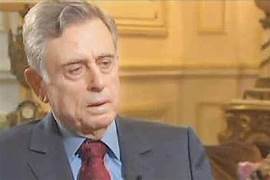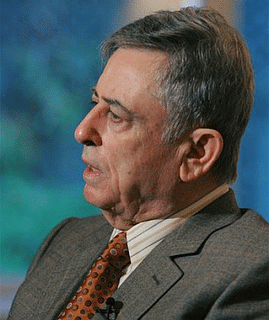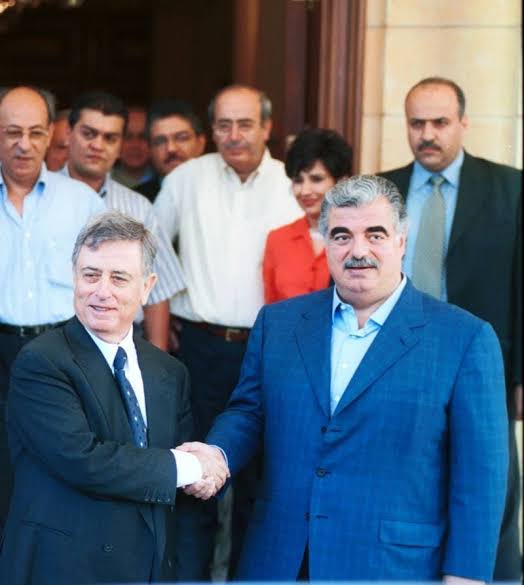Paris, from our correspondent Élie MASBOUNGI
Newly self-proclaimed leader of the Syrian opposition, Abdel Halim Khaddam, claims to be carrying a political project for radical change in Syria—a change that, according to him, will take place within the framework of a movement, a style, and a democratic method “unique to Syria” and incomparable to what happened in Ukraine or, more recently, in Lebanon.
The former Syrian vice president discussed this change, as well as his hearing last Friday before the international commission investigating the assassination of Rafic Hariri, his vision for future Lebanese-Syrian relations, and other issues concerning his country and the entire region in an interview over the weekend with L’Orient-Le Jour. The interview took place at his private residence in Villa Saïd, a street with blocked exits and tight security at the lower end of Avenue Foch, in Paris’s 16th arrondissement.
The formidable “Abu Jamal,” who himself orchestrated and solidified Syria’s control over Lebanon thirty years ago before managing it with an iron fist, asserts that he never truly opposed anyone except those who showed complacency toward Israel and those who, at the time, placed their hopes on the Hebrew state for resolving the Lebanese issue.
The Interview:
Question: What can you tell us about your testimony before the UN investigation commission?
Answer: “I met with Detlev Mehlis for more than an hour. He asked me a number of questions, and I provided him with the information in my possession. I did not ask him what information he had, nor did I ask for his impressions of what I told him. Naturally, the confidentiality of the investigation requires that I do not disclose the content of this meeting.”
Q – As someone uniting Syrian opposition forces, organizations, and individuals demanding real change in Syria, what are your chances of success, and who are your allies in this battle?
A – “My greatest ally is the Syrian people, who are enduring an extremely harsh situation due to the enormous mistakes committed by the regime, both domestically and internationally. Contacts are currently underway with a number of Syrian forces and personalities. Based on these contacts, methods of action and collaboration will be defined. The key is to bring about change within the framework of a democratic system that restores public freedoms and guarantees the Syrian people the right to choose their leadership.”
Confidence in the Future
Q – You have spoken out against resorting to a coup and the use of violence, instead advocating for mass mobilization and action by the Syrian people. Can your movement then be compared to the Ukrainian model or even the Lebanese one, as we have recently seen? Are such movements possible in Syria, and what would be the cost if there were repression?
A – “There will be a uniquely Syrian experience, specific to our country, unlike any other. It will be discussed with Syrian political leaderships, both inside and outside the country. I am optimistic in this regard and confident in the future. For now, the current authorities are in disarray. I believe that the pressure on them will only intensify due to their repeated mistakes.”
Q – What is your current status in France? Are you merely a visitor, and do you foresee a time when you might seek political asylum in this country?
A – “This question is not up for discussion. I will ask for nothing, and no one will impose anything on me. I have had no contact with any official body in France.”
Q – How can you reassure the Lebanese about normalizing relations between our two countries under a regime led by you? What is your position on the establishment of diplomatic relations between Beirut and Damascus and the demarcation of the border between the two countries?
A – “I am not seeking to lead a new government in Syria. What I deeply wish for is Syria to reclaim its national role, to recover and overcome its hardships—economically, politically, and socially. The new expected regime in Syria will, in accordance with the will of the entire Syrian people, work to strengthen ties between the two nations. How and in what way? That is not for me to decide, but rather for the Syrian and Lebanese governments.
All Syrians wish the best for Lebanon because a strong and stable Lebanon will support Syria, just as a strengthened Syria will be a great support for Lebanon.
No one in Syria wants to relive the experience that the security apparatus imposed on Lebanon. There will be no Syrian-Lebanese security system, but rather a government and an authority in Syria with no ambitions of dominance over Lebanon.”
Q – How can you reassure the Lebanese that a new Syrian regime, in which you will at least be a key figure, will treat them according to the noble principles you have just mentioned, knowing that you are still the same rigid, firm, and severe Abdel Halim Khaddam they once knew?
A – “I do not wish to revisit Lebanon’s past phases. I have no intention of reopening files here and there. However, I will soon write and publish my memoirs, which will also cover Lebanon during the period when I was overseeing the Lebanese file. After reading these memoirs, every Lebanese can form their own opinion and express their convictions.
Those who disagreed with me should ask themselves what the causes of our disagreements were. I had disputes with some Lebanese because of Israel. Should I now say that I was wrong to oppose them while they were collaborating with Israel? I do not want to name names or reopen cases, especially given Lebanon’s current circumstances. But things will become clearer later, under different circumstances and conditions.
My memoirs will be published in a few months, and I have promised Ghassan Tuéni that he will have priority in serializing them.”
Q – What about a possible collaboration between you and the Muslim Brotherhood? How can you reassure the Lebanese, who fear that such cooperation could lead to an Islamist drift that no one wants?
A – “As Lebanese, you demand that Syria have a regime that does not interfere in Lebanon’s internal affairs. But in return, the Lebanese must not interfere in Syria’s internal affairs. The Muslim Brotherhood is a political movement with a long history in Syria.
We clashed due to mistakes made both by them and by the Baathists. Today, Syria needs all its sons to rebuild the country and face the dangers it encounters. All political forces and national capabilities in Syria are invited to cooperate, and it is essential to bury past conflicts. I exclude no one and have no reservations against anyone as long as the common goal is to serve Syria.”
Q – What message would you like to send to the Lebanese people today, perhaps to reassure and convince them?
A – “My message is essentially a call to the entire Lebanese people to preserve their national unity and make this unity the top priority. Your national unity must be your main concern. Do not allow any space for divisions on this matter. Anyone who takes a stance that does not serve this unity harms their country and themselves.
Any current disputes are minor compared to the unity of the country.
I also want to emphasize that all Syrians are concerned about anything that could harm Lebanon’s security and stability.
Moreover, it is important that Lebanese politicians or others do not hold the Syrian people or Syrians in Lebanon responsible for mistakes committed by certain security officials during their presence in Lebanon.”



